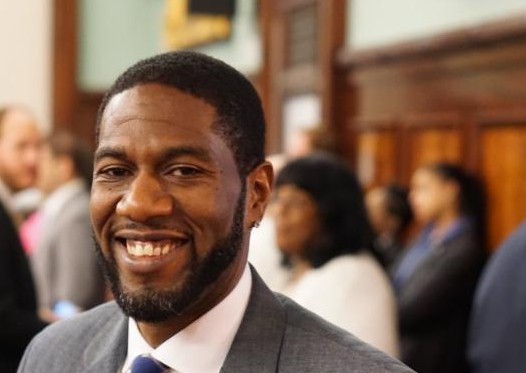[State of the City\Public Advocate Response]
Public Advocate Williams: “Our children should not be over-policed…Law enforcement should not be responding to mental health crises- that approach has led to tragedy, and it’s neither appropriate for those in need who are making the call, nor fair to the officers answering it.”
Photo: Facebook
Public Advocate Jumaane D. Williams delivered a live response to Mayor Bill de Blasio’s State of the City address Thursday.
Williams discussed several areas in which he feels the city is not adequately responding to the needs of New Yorkers.
The full text of the address as prepared is below, and a video stream is available here.
“I just finished watching Mayor de Blasio’s State of the City Address, and first, I want to thank the Mayor for taking a real, direct approach to the real, pressing issues that New Yorkers are confronting every day and concerned about each night.
“In his address, he announced a number of strong actions that are deserving of commendation and aligned with the progressive vision promised for New York City– like the expansion of 3K and other early childhood efforts, and supporting those same youth as they grow up, with a community-driven approach. I want to reiterate something he said – that our children should not be over-policed, they should be reached, and to emphasize that from the top down, our policies need to align with that mission statement.
“I also want to commend the efforts announced to support small businesses, including through subsidies, free legal services, and investing city pensions in the people who drive our economic growth.
“As we continue to uplift working people and expand rights like paid time off, it’s critical that we make these kinds of investments in the small businesses which should be the backbone of our city.
“I hope to work with the administration on a number of these initiatives – and to ensure that the reality of change meets the promise of progress.
“The Mayor spoke of the need to save our city, and he may be right – but in many cases, at critical points, past opportunities to take on issues have been met with policies that were either insufficient to address the scale of need, or further deepening it. So I want to take a moment to talk about a few things I think deserve greater discussion and bolder solutions.
“As I said in my own address a few weeks ago, the state of our city is found in its people and in the real, personal impact they feel every day, what they’re facing and bringing to government leaders, asking what we can do. The number one thing I’m asked about continues to be housing. I’m glad that today, the Mayor announced several important steps to expand housing affordability, both in availability and in cost, setting new goals and supporting vital tenant protections. But these new targets come after years of lost time- and in this case, time is units, both built and preserved. Those units are desperately needed, because the state of our city’s housing and homelessness is a crisis. It’s one that has been exacerbated over the last several years, and one that the plans of the past couldn’t meet. That’s unsurprising, given that the city is the worst landlord in New York, through its mismanagement and underfunding of NYCHA. In the last year, NYCHA has earned a new chair, a federal monitor, but not its tenants trust.
“Fixing NYCHA will require real investment. The current city budget proposal cannot keep up with the trend of disrepair, much less reverse it, especially as the state continues to deny critical funding. There is a moral responsibility to meet the same basic standards we would expect of any private landlord – but when I have visited the homes of NYCHA tenants, the standard has been an excess of mold and an absence of heat. Dangerous conditions include lead contaminations, rodent infestations and long-delayed repairs as trash and work orders build up. And that responsibility, or irresponsibility, falls to issues of management.
“In public housing and among private landlords, the city needs to renew a focus on repairing declining and dangerous conditions – that means funding NYCHA, but it also means expanding the city’s inspection capability to hold the worst landlords accountable.
“It’s critical that we build and preserve affordable housing with a focus on the people who most need it – when city vouchers are required, and even then aren’t enough to cover rent, it’s not affordable. When we focus on acute solutions and not sustainable, supportive housing, it’s not affordable. And when rezonings lead to displacement of families, to acutely rising rents and falling neighborhoods, it’s not affordable to those who need it most. That’s why we need a new and aggressive approach to income-targeted affordability, and it’s why we need to mandate a racial impact study ahead of each new rezoning to prevent communities of more color from disappearing. I invite the Mayor to support my bill that would do just that.
“But housing is just one area where we need to realign our priorities to long-term solutions.
“The state of our city’s mental health crisis response is one of misplaced money and priorities. For New Yorkers experiencing a mental health crisis, this administration has continued to resist a full transition away from a law enforcement response and toward a public health response.
“Law enforcement should not be responding to mental health crises- that approach has led to tragedy, and it’s neither appropriate for those in need who are making the call, nor fair to the officers answering it. We can’t expect police to do everything, and I don’t expect nine-one-one dispatchers to make the decisions trained mental and behavioral health professionals should be. Whether encounters are fatal- as they were for Dwayne Jeune and Deborah Danner, whose families needed aid and were met with force, – or otherwise traumatic and damaging, as for the sons of Peggy Herrera, Tanya Thompson, or all those whose names and stories we don’t know. That’s why I’ve proposed legislation to create an emergency number specifically for mental health crises, for emergency response aimed at de-escalation, intervention, prevention, and post-crisis management.
“We need to support that plan through substantive funding, both to respond to crises and to prevent them. We have been a part of shifting the conversation – and now we need to shift the money, toward mobile crisis teams with more rapid response times, toward respite centers for people experiencing imminent crisis, and diversion centers as an alternative to incarceration.
“Again, complex problems can rarely be met with acute solutions, and our office has put forth a plan to address mental health crises on multiple fronts. Unfortunately, the administration has not supported our comprehensive plan, but I know that the longer we wait to implement it, the worse the state of this crisis will become.
“And I know that those with power and privilege need to use it to help those without.
“The state of our city’s utilities is one of power in the wrong hands. In the last year New Yorkers have seen widespread blackouts and limited accountability, with affected neighborhoods being left in the dark. With no electricity and no warning, communities like Central Brooklyn and people like my uncle were cut off from critical resources in a moment of need, confusion, and fear. For months following, New Yorkers were held hostage, used as a bargaining chip in a political debate over pipelines while seeing their homes lose heat and their businesses lose money.
“And through it all, there have been rate hikes – major corporations demanding more money but not providing adequate power – so it’s time to take it back. That means providing oversight, and accountability, for the major corporations where we’ve misplaced trust for too long.
“It also means the creation of newly democratized energy sources, expanding the public’s role on both a city and state level.
“We need to rethink how we power New York, and empower New Yorkers through a system that is more directly and clearly accountable and transparent. I want to commend the Mayor for setting new targets and making new commitments to support green construction, green energy production and transmission, but we need to be more bold. Democratizing energy will help to bring down costs, consolidate billing, and move forward a just transition away from fossil fuels.
“In our city, we cannot let the scope of the problems outweigh the urgency of the solutions. Nor can we be confined by what’s been done before, or by small adjustments to systemic failings. We need the courage to push back against political winds, not to go with them just because it’s easier. And we need the people of New York City to stand united in the effort to move all of us forward together.
“I implore the administration to be a partner in this progress, to take the words from today’s speech, many of which I’ve waited a long time to hear, and to deliver with action. I haven’t seen this Mayor in many years, but I’m glad he’s here, and I hope to work with him on behalf of the people to deliver the transformational change that this moment demands. Thank you.”












